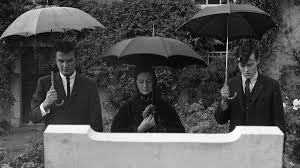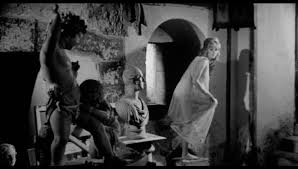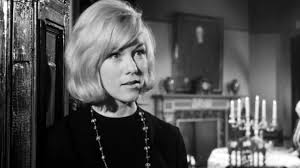
- Details:
- Directed by Francis Coppola
- Produced by Roget Corman
- Written by Francis Coppola
- Released September 25, 1963
- Running time 80 minutes.
- Budget $42,000
- Cast William Campbell, Luana Anders, Bart Patton, Mary Mitchell
Break Down:
A husband and wife go out late one night for a ride in their rowboat. While they are on the water, the couple begins to argue. They fight about the husband’s rich mother wanting to give a large sum of money to a charity, robbing the husband and wife of the money she feels they are owed. They continue to fight about how all the woman wants from the husband is his rich mother’s inheritance. He jokes about how if he dies out there, she will get nothing, and he rows harder. Suddenly, the man grabs his chest and falls over. While the wife leans over him, she curses, stating he knew he had an evil heart. Just before the husband dies, he comments that if she does not save him, she will get nothing from his family, no money. Then, the husband dies. Frantic, the wife decides to throw him over the side of the boat and head back home. When she gets home, she types a note to her mother-in-law, Lady Haloran, stating that her husband is away on business and she would like to visit the family at their castle in Ireland. Her plan is to con the family into putting her into the will.
The now secret widow, Louise Haloran, arrives at the castle and begins to notice strange things going on. It turns out, the daughter of Lady Haloran died years ago, having drowned in the pond. The family holds a yearly funeral-type tribute at the fallen child Kathleen’s grave. Every year, while they are mourning at the grave, the mother breaks down and faints. Louise helps her traumatized mother-in-law to her room and plants the seeds of her con. She figures out that the Lady of the castle is superstitious and obviously still wounded by her daughter’s loss, even though it was years ago that she drowned. Louise tells her mother-in-law that Kathleen has been trying to communicate with her from beyond the grave.
Louise then sneaks into Kathleen’s old room and steals some dolls from the dead girl. She takes them out to the pond, where the girl drowned and dived down to the bottom. Louise attaches them to the pond’s floor with the dolls attached to a string, ready to float to the top when the family is dining next to the pond. Once she attaches the dolls to the pond’s bottom, she sees what looks like the dead girls’ corpse, perfectly preserved, at the bottom of the pond. Louise screams and swims to the shore just in time to see a man standing there with an axe. The axe-man then hacks Louise up and drags her body out of the water.

The family doctor comes to the castle to check on the Lady and decides to solve the mystery when he hears of the disappearance. While he is playing detective, more souls are taken by the mysterious axe-man. The doctor has the pond drained and finds at the bottom a headstone that reads, “I’m sorry, Kathleen.’ Convinced that there is a sick mind at work on this estate, the doctor doubles down his detective skills. He narrows it down to one of the two sons of Lady Haloran until the film comes to a close during the most senior brothers’ wedding ceremony. The doctor finds a shack with the bodies of those killed and a perfectly preserved corpse of Kathleen. The doctor sets the body in the middle of a courtyard with the headstone attempting to draw the killer out. When the new bride attempts to touch Kathleen to see if she is dead, the youngest Haloran brother attacks her with an axe. Just as it seems he will kill either his new sister-in-law or older brother, the doctor shoots the killer ending his murderous spree.
Dementia 13 was the first mainstream film written and directed by Francis Coppola. Coppola is best known for directing classics like The Godfather, Apocalypse Now, The Outsiders, and Bram Stokers Dracula. Coppola was working with Roger Corman on Corman’s film, The Young Racers, as a sound man. When The Young Racers finished filming in Ireland, the budget still had $22k left. Corman decided to use the money to make another short film. His schedule, however, would not allow him, so he worked a deal with Coppola to stay in Ireland and film a new movie. Coppola has said, “Roger wanted to make Dementia 13 cheaply. He wanted it to be homicidal, sort of a copy of Psycho…so I wrote the script…” While watching the film, it is evident that Psycho was an influence in the murder scenes, although Dementia 13 tells a story that stands on its own. A tale that Coppola wrote in one night. The next day he explained the first axe killing scene to Corman. “A half-naked woman ties several dolls to the bottom of a lake, then surfaces to find herself at the feet of an axe murderer: axed to death,” Coppola told him. Just with the details of that scene, Corman left Coppola in Ireland with a crew and a $22k budget to make the film.
Coppola contacted a few of his friends from UCLA. He asked them if they would like to be in the film, and those that agreed flew out to Ireland, many on their own dime. With such a small budget, Coppola had to get creative with how to pay everyone. The majority of the Irish cast members only made minimum wage. The entire cast and crew bunked together in a farmhouse.
Even though the film seemed to have to cut corners to keep the cost down, it holds up after all these years. The amount of suspense and mystery in this classic slasher story builds throughout the entire film. A few times while viewing, it may seem like one brother is the killer only to second guess that idea a few scenes later. An actual art piece is not only the horror genre but classic film altogether. Dementia 13 transcends generations and proves that a good story full of tension can make any budget work.
Watch “Dementia 13” on TheLastPicture.Show
Written exclusively for TheLastPicture.Show by Jacob Ruble
Disclosure: The links on this page are “Affiliate Links” and while these are shown at no costs to our viewers, they generate commissions for our website(s)


